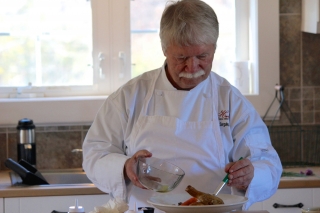
The Responsibility of Lighting Passion’s Fire
06 October 2021Why do we cook? A student’s answer may define their career.
By Paul Sorgule, MS, AAC
Educators have a responsibility that goes beyond teaching young people to cook, preparing them for the rigors of kitchen life, or even connecting them with potential employers. Yes, this is a major part of our job description, but behind it all lies something more important – an essential ingredient that will define how each graduate moves through his or her career. We have the responsibility for lighting the fire of passion.
There are cooks and there are great cooks that can be defined by their product. But the ones who are also happy with their career choice are the ones who approach each day with vigor and commitment to continued growth, learning, understanding and expression. These are the individuals who cook for a reason. These are the cooks who relish the opportunity to do what they do and impact the lives of coworkers and guests. These are the cooks who inspire others and represent the best the food industry has to offer. The opportunity to help these special cooks mature and shine lies in the educator’s hands.
“Why do we cook?” This is the question that needs an answer. This question will help define a student’s career path and pursuit of happiness. It’s a question that also may point to a chance for disappointment and eventual career change. It just may be the most important question you ask your students and the most telling question they ask themselves.
Do they cook because it leads to a progression of jobs, each with added responsibility and benefits? Do they cook because they might become a chef of renown? Do they cook to win accolades for their work? Do they cook because the process of working with nature’s bounty is so fulfilling? Do they cook because it affords them a chance to work collaboratively with others as they provide a reason for guests to celebrate? Do they cook because they know their work feeds the body, mind, and soul of the person who consumes their food? Do they cook because what they do is an important way of bringing people together, even if just for a moment? The answer to this question will define how the rest of their professional lives will go. This will determine real success, lasting success, and rewards that go way beyond the paycheck.
We should not lose sight of the importance of this process of learning part. This question is not a component of your curriculum and can never be graded; nor can a right or wrong answer be established. This question is the basis of mentorship, the core of advisement that a teacher can offer.
When you unlock that kitchen door tomorrow morning, turn on the lights and hood fan, print off your lesson plan for the day, and organize your coolers in preparation for another period of instruction, make sure that you write on that whiteboard – a simple question; a question that is far more important than any other:
“Why do you cook?”
As the restaurant industry sifts through the myriad of challenges that are presented every day, it is important to note that many of those challenges relate to the answer to this question. Let’s start asking it now – it is our responsibility to do so.
PLAN BETTER – TRAIN HARDER
Paul Sorgule, MS, AAC, president of Harvest America Ventures, a mobile restaurant incubator based in Saranac Lake, N.Y., is the former vice president of New England Culinary Institute and a former dean at Paul Smith’s College. Contact him at This email address is being protected from spambots. You need JavaScript enabled to view it..
